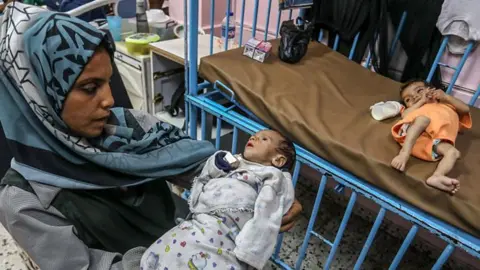A pressing humanitarian crisis is unfolding in Gaza City, where reports reveal that one in five children is suffering from malnutrition, according to the United Nations Relief and Works Agency for Palestine Refugees in the Near East (UNRWA). Collated data indicates that this alarming issue is exacerbating daily, prompting the UN to declare one of the most severe hunger crises the region has faced. Philippe Lazzarini, the UNRWA Commissioner-General, echoed the despairing sentiments of local staff members, describing the people of Gaza as “walking corpses,” indicative of the traumatic conditions that persist in the territory.
The alarming malnutrition rates among children have garnered international attention, leading over a hundred organizations, including human rights groups, to issue warnings of potential mass starvation. These groups are now calling on global governments to implement immediate action to alleviate the pervasive hunger afflicting Gaza. In contrast, Israeli authorities have denied the existence of a siege, attributing the malnutrition crisis instead to Hamas’s handling of resources and aid within the region.
Despite these denials, compelling evidence from the UN suggests that the level of humanitarian aid reaching Gaza has dwindled to a mere trickle, a far cry from what is needed. On Thursday, Lazzarini noted with grave concern that over a hundred individuals—predominantly children—have reportedly succumbed to hunger. The situation is dire, as many malnourished children are showing symptoms of emaciation and weakness, with healthcare professionals citing an urgent need for treatment to avert more fatalities.
The reports further indicate a distressing trend in the local workforce, where UNRWA employees are collapsing due to hunger during their shifts. Lazzarini highlighted the alarming reality that without adequate provisions, the humanitarian infrastructure itself is on the verge of collapse. The World Health Organization (WHO) has echoed these concerns, asserting that a significant portion of Gaza’s population appears to be on the brink of starvation, labeling the crisis as “man-made.”
Personal accounts from locals further illustrate the severity of the situation. Hanaa Almadhoun, a 40-year-old resident in northern Gaza, reported that food items are often either scarce or priced beyond the means of average citizens. The high cost of essential supplies, such as flour, has led families to resort to desperate measures, including selling their valuables. Almadhoun described grim scenes of children scavenging through refuse in search of leftover food.
In a statement made by Israeli President Isaac Herzog during a visit to troops, he asserted that Israel was adhering to international laws regarding humanitarian aid. However, employees like Tahani Shehada, who work on the ground within Gaza, have countered this narrative by describing how families are struggling to sustain themselves, engaging in daily battles to secure basic necessities.
One poignant account came from Najah, a 19-year-old widow sheltering in a hospital, who expressed her fear of the violence surrounding aid distribution sites. She indicated that the grim reality of daily life involved a constant struggle for basic items like food and water, while emblazoned sentiments of hopelessness reflect the pervasive atmosphere of despair.
The United Nations has cited a death toll exceeding 1,000 among Palestinians seeking food aid as a result of confrontations near aid distribution points. The situation has spurred outrage and demands for intervention, with accusations squarely aimed at Hamas for exacerbating violence in these areas.
As the crisis unfolds, the collective voices of those in Gaza—like that of a pregnant woman expressing dread at the thought of giving birth amid such devastation—underscore the urgency for international focus and a humanitarian response. The persistent theme in these narratives conveys a horrifying reality where survival is fraught with peril, reinforcing the need for immediate action to support the beleaguered population of Gaza City.












